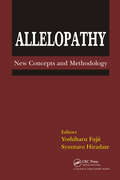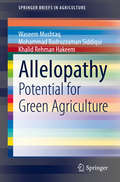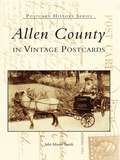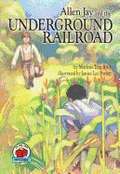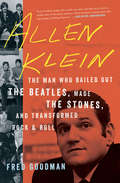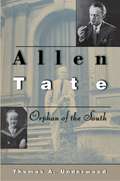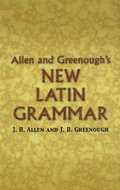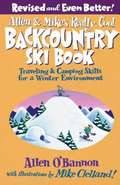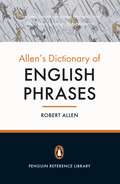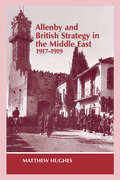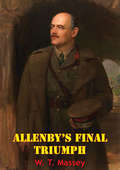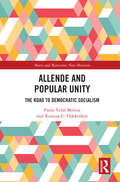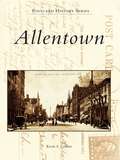- Table View
- List View
Allelopathy: New Concepts & Methodology
by Yoshiharu Fujii Syuntaro HiradateThe principal goal of allelopathy is to foster sustainable agriculture, forestry, and environment. The objective is to minimize the industrial chemicals and to maximize the use of natural resources locally available while improving crop productivity, forestry and the environment. The technological advances made in allelopathy research in recent years have been created, analyzed, and developed by scientific establishments throughout the world. They present exciting and intellectually challenging problems which are solvable using modern techniques. These modern and advanced techniques as described in the chapters presented in this volume are representative of the exciting research and development approaches today.
Allelopathy: Potential for Green Agriculture (SpringerBriefs in Agriculture)
by Khalid Rehman Hakeem Waseem Mushtaq Mohammad Badruzzaman SiddiquiAllelopathic studies may be defined in various aspects; weed against weed/crop and vice versa. This book focuses on the ways to utilize the allelopathic potential of weeds or crops for controlling weeds in the agroecosystems. Vigorous use of herbicides is poisoning our environment at an alarming rate; allelopathy can be employed as a useful alternative to control weeds naturally under field conditions. The book contains chapters on the history of allelopathy; allelopathic potential of several important crops (rice, wheat, sorghum, maize, mustard, sunflower) and weeds (members of Solanaceae, Convolvulaceae, Asteraceae, Verbenaceae). Moreover, it highlights how the allelopathic potential of these weeds and crops can be employed effectively to suppress weeds under field conditions. The book also discusses topics on the role of allelochemicals in agroecosystems; impact on local flora; biotic stress induced by allelochemicals; mechanism of action of allelochemicals and future prospective of allelopathy. Prepared with basic concepts and importance of allelopathy, this book is intended for the agricultural community, botanists, students and researchers.
Allen And Mike's Really Cool Backpackin' Book: Traveling And Camping Skills For A Wilderness Environment
by Allen O'Bannon Mike ClellandThe dynamic duo has done it again Following up on the incredible success of their two previous bestsellers, Allen and Mike's Really Cool Backcountry Ski Book and Really Cool Telemark Tips, these two National Outdoor Leadership School (NOLS) instructors and hardcore backcountry fanatics once again combine their years of experience into a hilarious and vastly informative book on the art of backpacking. Fans know how Allen O'Bannon and Mike Clelland play off each other to provide a one-two punch that makes readers laugh and learn at the same time. Beginning backpackers will cherish the advice, and experts who think they know it all are guaranteed to pick up a few tricks from this book -- while the entertainment value alone is worth the price. From day-hiking to extended expeditions, this book covers the whole spectrum of backpacking adventrue and is certain to become a classic of the genre. Allen O'Bannon is a senior NOLS instructor who writes books to support his ski habit. Mike Clelland is a NOLS instructor and illustrator who studied Mad magazine rather than go to art school. When not teaching NOLS classes, they live in Idaho, in the shadow of the Tetons.
Allen College (Campus History)
by Marcea K. SeibleIn the early 1920s, Waterloo businessman Henry B. Allen donated $200,000 and 80 acres of land to the Allen Memorial Hospital Association to establish a hospital in memory of Mary, his wife. The hospital opened in 1925 and was operated by the Deaconess Hospital Association of the Evangelical Church. The School of Nursing was founded in 1925, but a lack of resources during the Depression forced the hospital into receivership and the school was closed. Hospital management was assumed by the Lutheran Good Samaritan Society in 1938, and the school reopened in 1942 as the Allen Memorial Hospital Lutheran School of Nursing. In 1989, the school became Allen College of Nursing, a degree-granting institution. Today, as Allen College–UnityPoint Health, it offers an associate degree in radiography; bachelor of science degree in nursing; bachelor of health science degree with majors in diagnostic medical sonography, nuclear medicine technology, medical laboratory science, public health, and dental hygiene; master of science degrees in nursing and occupational therapy; and two doctoral degrees in health professions education and nursing practice. Throughout its 90-year history, Allen College has remained faithful in its mission to prepare health care professionals for their roles in society.
Allen County in Vintage Postcards (Postcard History Series)
by John Martin SmithThe fleeting scenes of Robison Park, Cathedral Square, and Fort Wayne's many parks have often been captured in postcards sent or collected by Allen County's residents and visitors. Captured here in over 200 vintage postcards and images is the history of Allen County, chosen by local merchants, depicting the thriving downtown areas, booming industries, and quiet, pleasant residential sections.Allen County provides a visual 40-year history of Allen County. This vast collection provides a wide range of fascinating images and poignant messages preserved on 1¢ postcards, including the socials, events, buildings, homes, and residents of the past from the towns of Allen County, including Churubusco, Fort Wayne, Grabill, Huntertown, New Haven, Monroeville and Zanesville.
Allen Distribution Co.
by Pearson Hunt Robert F. VandellA new credit department manager plans to set the tone of his department by reviewing marginal accounts.
Allen Iverson: Fear No One
by John SmallwoodHE HAS TAKEN HIS GAME -- AND THE GAME -- TO A NEW LEVEL He grew up in Virginia with nothing but his talent and his heart. But he had The Plan: his never-say-die dream to become an NBA superstar. So he began his journey down a road full of obstacles. But the world underestimated Allen Iverson.... Fear No One From his first days playing college hoops...to his turbulent early years in the pros...to his leading the Philadelphia 76ers to the 2001 NBA Finals and being named league MVP, here is the real story of controversial superstar Allen Iverson. Acclaimed sports journalist John Smallwood -- who has covered Iverson extensively -- shows readers the Iverson they never knew: the boy, the man, the rapper, the player, the role model, and the icon. Get to know ALLEN IVERSON...the man behind the legend.
Allen Iverson: Fear No One
by SmallwoodHE HAS TAKEN HIS GAME -- AND THE GAME -- TO A NEW LEVEL He grew up in Virginia with nothing but his talent and his heart. But he had The Plan: his never-say-die dream to become an NBA superstar. So he began his journey down a road full of obstacles. But the world underestimated Allen Iverson.... Fear No One From his first days playing college hoops...to his turbulent early years in the pros...to his leading the Philadelphia 76ers to the 2001 NBA Finals and being named league MVP, here is the real story of controversial superstar Allen Iverson. Acclaimed sports journalist John Smallwood -- who has covered Iverson extensively -- shows readers the Iverson they never knew: the boy, the man, the rapper, the player, the role model, and the icon. Get to know ALLEN IVERSON...the man behind the legend.
Allen Jay And The Underground Railroad
by Marlene Targ Brill Janice Lee PorterAllen Jay's family farm is a stop on the Underground Railroad. Allen's parents give food and shelter to slaves escaping from the South. One day in 1842, Allen's father asks him to help a runaway slave. Is Allen brave enough? This exciting true story takes you along as Allen meets Henry James, an African American man struggling to find freedom.
Allen Klein: The Man Who Bailed Out the Beatles, Made the Stones, and Transformed Rock & Roll
by Fred GoodmanThe story of the notorious rock and roll manager, revealing new, behind-the-scenes details about some of the biggest bands in music history. Allen Klein was like no one the music industry had seen before. Though he became infamous for allegedly causing the Beatles&’ breakup and robbing the Rolling Stones, the truth is both more complex and more fascinating. As the manager of both groups—not to mention Sam Cooke, Pete Townshend, Donovan, The Kinks, and numerous others—he taught young soon-to-be legends how to be businessmen as well as rock stars. While Klein made millions for his clients, he was as merciless with them as he was with anyone, earning himself an outsize reputation for villainy that has gone unchallenged until now. Through unique, unprecedented access to Klein&’s archives, veteran music journalist Fred Goodman tells the full story of how the Beatles broke up, the Stones achieved the greatest commercial success in rock history, and the music business became what it is today. &“Fred Goodman makes this world come alive, and any fan of rock or insider tales of the music industry will be in heaven reading about this fascinating, troubling character.&” —Judd Apatow &“Writing about contracts, percentages and deals can be tedious, but Goodman makes it as exciting as reading about an artist&’s sex life. The book explodes with inside dope.&” —Daily News (New York) &“Succeed[s] both as a compelling work of rock-&’n&’-roll history and as a cautionary business primer.&” —The Wall Street Journal
Allen Lane
by Michael J. Roberts Howard H. StevensonDescribes Allen Lane's search for a business to buy. The case explores several failed attempts and the ethical, business, and tax issues that surround the acquisition business. Ends with a description of a new acquisition candidate, an independent valuation report of this business, and with Allen Lane preparing his bid.
Allen Park
by Allen Park Historical Museum Sharon BroglinAllen Park's history begins when Native Americans hunted, fished, and paddled their canoes along the banks of Ecorse Creek. The French were among the earliest settlers, and after the land was cleared, German farmers arrived. Ecorse Township, known today as Downriver, was divided into seven different cities, and Allen Park was born. Once characterized as a "lazy, farming hamlet," Allen Park's residents were the most influential in developing the Village of Allen Park out of Ecorse Township, in 1927, and worked to become the City of Allen Park in 1957. Henry Ford's $5 workday prompted many farmers to sell to developers and go to work for Ford. Hungarians, Poles, Italians, and Armenians moved in, becoming the major ethnic groups within the community. Among the city's celebrities there have been writers, radio and sports personalities, cartoonists, and fashion designers. Towering over the Interstate 94 corridor in Allen Park, the Uniroyal Giant Tire has become an American icon, and although the Veterans Administration medical center is gone, it will forever live in residents' hearts. Enjoy the city's story, gathered from the files of the Allen Park Historical Museum.
Allen Tate: Orphan of the South
by Thomas A. UnderwoodDespite his celebrity and his fame, a series of literary feuds and the huge volume of sources have, until now, precluded a satisfying biography of Allen Tate. Anyone interested in the literature and history of the American South, or in modern letters, will be fascinated by his life. Poetry readers recognize Tate, whom T. S. Eliot once called the best poet writing in America, as the author of some of the twentieth century's most powerful modernist verse. Others know him as a founder of The Fugitive, the first significant poetry journal to emerge from the South. Tate joined William Faulkner and others in launching what came to be known as the Southern Literary Renaissance. In 1930, he became a leader of the Southern Agrarian movement, perhaps America's final potent critique of industrial capitalism. By 1938, Tate had departed politics and written The Fathers, a critically acclaimed novel about the dissolution of the antebellum South. He went on to earn almost every honor available to an American poet. His fatherly mentoring of younger poets, from Robert Penn Warren to Robert Lowell, and of southern novelists--including his first wife, Caroline Gordon--elicited as much rebellion as it did loyalty. Long-awaited and based on the author's unprecedented access to Tate's personal papers and surviving relatives, Orphan of the South brings Tate to 1938. It explores his attempt, first through politics and then through art, to reconcile his fierce talent and ambition with the painful history of his family and of the South. Tate was subjected to, and also perpetuated, fictional interpretations of his ancestry. He alternately abandoned and championed Southern culture. Viewing himself as an orphan from a region where family history is identity, he developed a curious blend of spiritual loneliness and ideological assuredness. His greatest challenge was transforming his troubled genealogy into a meaningful statement about himself and Southern culture as a whole. It was this problem that consumed Tate for the first half of his life, the years recorded here. This portrait of a man who both made and endured American literary history depicts the South through the story of one of its treasured, ambivalent, and sometimes wayward sons. Readers will gain a fertile understanding of the Southern upbringing, education, and literary battles that produced the brilliant poet who was Allen Tate.
Allen and Greenough's New Latin Grammar
by James B Greenough G. L. Kittredge Benj. L. D'Ooge A. A. Howard J. H. AllenA venerable resource for more than a century, Allen and Greenough's New Latin Grammar is still regarded by students and teachers as the finest Latin reference grammar available. Concise, comprehensive, and well organized, it is unrivaled in depth and clarity, placing a wealth of advice on usage, vocabulary, diction, composition, and syntax within easy reach of Latin scholars at all levels. This sourcebook's three-part treatment starts with words and forms, covering parts of speech, declensions, and conjugations. The second part, syntax, explores cases, moods, and tenses. The concluding section offers information on archaic usages, Latin verse, and prose composition, among other subjects. Extensive appendixes feature a glossary of terms and indexes. Students of history, religion, and literature will find lasting value in this modestly priced edition of a classic guide to Latin.
Allen and Mike's Really Cool Backcountry Ski Book: Traveling and Camping Skills for a Winter Environment
by Allen O'Bannon Mike ClellandAllen & Mike are back with totally updated information and first-hand advice for all aspects of backcountry skiing and winter camping. Learn how to choose the right equipment, avoid hazards such as avalanches and extreme cold, build snow shelters, and have fun while staying safe and minimizing the impact on the wilderness. These two National Outdoor Leadership School instructors offer lots of tried-and-true tricks and useful tips drawn from years of experience.
Allen's Dictionary of English Phrases
by Robert AllenAllen’s Dictionary of English Phrases is the most comprehensive survey of this area of the English language ever undertaken. Taking over 6000 phrases, it explains their meaning, explores their development and gives citations that range from the Venerable Bede to Will Self. Crisply and wittily written, the book is packed with memorable and surprising detail, whether showing that 'salad days' comes from Antony and Cleopatra, that 'flavour of the month' originates in 1940s American ice cream marketing, or even that we’ve been 'calling a spade a spade' since the sixteenth century. Allen’s Dictionary of English Phrases is part of the Penguin Reference Library and draws on over 70 years of experience in bringing reliable, useful and clear information to millions of readers around the world – making knowledge everybody’s property.
Allenby and British Strategy in the Middle East, 1917-1919 (Military History and Policy #No. 1)
by Matthew HughesExamines British military, political and imperial strategy in the Middle East during and immediately after the First World War, in relation to General Allenby's command of the Egypt Expeditionary Force from June 1917 to November 1919.
Allenby's Gunners: Artillery in the Sinai & Palestine Campaigns 1916-1918
by Alan H. SmithAlan Smith&’s Allenby&’s Gunners tells the story of artillery in the highly successful World War I Sinai and Palestine campaigns. Following Gallipoli and the reconstitution of the AIF, a shortage of Australian gunners saw British Territorial artillery allotted to the Australian Light Horse and New Zealand Mounted Rifle brigades. It was a relationship that would prove highly successful and &‘Allenby&’s Gunners&’ provides a detailed and colourful description of the artillery war, cavalry and infantry operations from the first battles of Romani and Rafa, through the tough actions at Gaza, the Palestine desert, Jordan Valley and Amman to the capture of Jerusalem. The story concludes with the superb victory at Megiddo and the taking of Damascus until the theatre armistice of October 1918. Smith covers the trials and triumphs of the gunners as they honed their art in one of the most difficult battlefield environments of the war. The desert proved hostile and unrelenting, testing the gunners, their weapons and their animals in the harsh conditions. The gunners&’ adversary, the wily and skilful Ottoman artillerymen, endured the same horrendous conditions and proved a tough and courageous foe. The light horsemen and gunners also owed much to the intrepid airmen of the AFC and RFC whose tactical and offensive bombing and counter-battery work from mid-1917 would prove instrumental in securing victory. This is an aspect of the campaign that is seamlessly woven throughout as the action unfolds. The Sinai and Palestine campaigns generally followed a pattern of heavy losses and setbacks for an initial period before Allied forces eventually prevailed. This is a highly descriptive volume that tells an oft-neglected story and fills a gap in the record of a campaign in which Australians played a significant role. It is a welcome addition to the story of the Australians in the Middle Eastern campaigns of World War I.
Allenby's Gunners: Artillery in the Sinai & Palestine Camptaings, 1916–1918
by Alan H. SmithAlan Smith's Allenby's Gunners tells the story of artillery in the highly successful World War I Sinai and Palestine campaigns. Following Gallipoli and the reconstitution of the AIF, a shortage of Australian gunners saw British Territorial artillery allotted to the Australian Light Horse and New Zealand Mounted Rifle brigades. It was a relationship that would prove highly successful and Allenby's Gunners provides a detailed and colorful description of the artillery war, cavalry and infantry operations from the first battles of Romani and Rafa, through the tough actions of Gaza, the Palestine desert, Jordan Valley and Amman to the capture of Jerusalem. The story concludes with the superb victory of Megiddo and the taking of Damascus until the theater armistice of 1918.Smith Covers the trials and triumphs of the gunners as they honed their art in one of the most difficult battlefield environments of the war. The desert proved hostile and unrelenting, testing the gunners, their weapons and their animals in the harsh conditions. The gunners' adversary, the wily and skillful Ottoman artillerymen, endured the same horrendous conditions and proved a tough and courageous foe.The light horsemen and gunners also owed much to the intrepid airmen of the AFC and RFC whose tactical and offensive bombing and counter-battery work from mid-1917 would prove instrumental in securing victory. This is an aspect of the campaign that is seamlessly woven throughout as the action unfolds.The Sinai and Palestine campaigns generally followed a pattern of heavy losses and setbacks for an initial period before allied forces eventually prevailed. This is a highly descriptive volume that tells and oft-neglected story and fills the gap in the record of a campaign in which Australians played a significant role. It is a welcome addition to the story of the Australians in the Middle Eastern campaigns of World War I.
Allenby, A Study In Greatness: Allenby In Egypt (Allenby, A Study In Greatness #2)
by Field-Marshal Earl WavellIn this two-part biography, Field Marshal Wavell, charts the rise of the 1st Viscount Allenby, from a lowly cavalry lieutenant to the rank of Field Marshal.Allenby was commissioned into the 6th Dragoons in 1880, well-liked by his contemporaries but never considered overly talented. However under fire and in contact with the enemy during the Boer War, Allenby's talents began to come to the fore; tough and disciplined, he was rapidly promoted with each battlefield success. Afflicted by a rabid temper, which led to towering rages at subordinates, he was nicknamed "The Bull".When Europe descended into chaos and the horrors of the First World War in 1914, Allenby was given command of the only British cavalry brigade to be sent to France in 1914. The cavalry distinguished itself in the chaotic fighting of 1914, particularly at the First Battle of Ypres. As trench warfare removed any possibility of a war of movement, Allenby transferred to command of V Corps and then to lead Third Army. Allenby's tactics including frequent counterattacks led to heavy casualties would lead to his transfer to Egypt. Allenby organised, planned and executed the campaign across Egypt and the Palestine that threw the Ottoman army back all the way Aleppo before the armistice in 1918. Allenby would stay on in Egypt as High Commissioner between 1919-1925, dealing with the fluid and tricky politics of the area before his eventual retirement."Here is a piece of work well done and apt reading for the times. General Wavell is at once the pupil and successor of his great Palestine commander, and is qualified also by sobriety, detachment of view, and a gift of clear, concise writing. Three factors have combined...the skill of the very competent biographer; the crescendo of interest, culminating in one of the most brilliantly conceived victories in history, and, last and most, the rugged splendour of Allenby's character."--SIR RONALD STORRS, in The Spectator.
Allenby, A Study In Greatness: The Biography Of Field-Marshall Viscount Allenby Of Megiddo And Felixstowe (Allenby, A Study In Greatness #1)
by Field-Marshal Earl WavellIn this two-part biography, Field Marshal Wavell, charts the rise of the 1st Viscount Allenby, from a lowly cavalry lieutenant to the rank of Field Marshal.Allenby was commissioned into the 6th Dragoons in 1880, well-liked by his contemporaries but never considered overly talented. However under fire and in contact with the enemy during the Boer War, Allenby's talents began to come to the fore; tough and disciplined, he was rapidly promoted with each battlefield success. Afflicted by a rabid temper, which led to towering rages at subordinates, he was nicknamed "The Bull".When Europe descended into chaos and the horrors of the First World War in 1914, Allenby was given command of the only British cavalry brigade to be sent to France in 1914. The cavalry distinguished itself in the chaotic fighting of 1914, particularly at the First Battle of Ypres. As trench warfare removed any possibility of a war of movement, Allenby transferred to command of V Corps and then to lead Third Army. Allenby's tactics including frequent counterattacks led to heavy casualties would lead to his transfer to Egypt. Allenby organised, planned and executed the campaign across Egypt and the Palestine that threw the Ottoman army back all the way Aleppo before the armistice in 1918. Allenby would stay on in Egypt as High Commissioner between 1919-1925, dealing with the fluid and tricky politics of the area before his eventual retirement."Here is a piece of work well done and apt reading for the times. General Wavell is at once the pupil and successor of his great Palestine commander, and is qualified also by sobriety, detachment of view, and a gift of clear, concise writing. Three factors have combined...the skill of the very competent biographer; the crescendo of interest, culminating in one of the most brilliantly conceived victories in history, and, last and most, the rugged splendour of Allenby's character."--SIR RONALD STORRS, in The Spectator.
Allenby’s Final Triumph [Illustrated Edition]
by William Thomas MasseyIncludes the World War One In The Desert Illustration Pack- 115 photos/illustrations and 19 maps spanning the Desert campaigns 1914-1918THIS narrative, it is hoped, will serve to remove the impression which prevails among a not inconsiderable section of the British public that the Army commanded and handled with such consummate skill by Lord Allenby in Palestine had a comparatively simple task...In 1918 General Allenby had to contend with enormous difficulties. He was faced with the problem of having to arrange his operations so as to fit in with the calls made upon him to reinforce the Western Front. At a time when the Turkish moral was still good, he had to send to France the bulk of his veteran British infantry when they were in the highest state of efficiency, and, with new Indian troops in their place, he had to build up another army. In these pages I have tried to show how, while increasing the power of his fresh troops, he forced down the fighting capacity of his enemy, and then, when by a most ably worked out scheme of camouflage he had concealed scores of thousands of men and horses at the place of attack, he launched his host against an army whose moral he had reduced to a low level. By employing a magnificent body of cavalry he gave another lesson to the armies of the world in the employment of the mounted arm, and, uninfluenced by the desires of London and Paris that this or that should be his aim, his own plans, worked out in his own way, secured far more than War Councils or War Cabinets had any right to expect. The Army's appreciation of Lord Allenby is correct.
Allende and Popular Unity: The Road to Democratic Socialism (Marx and Marxisms)
by Paula Vidal Molina Ximena U. OdekerkenThis book is a fascinating collection of carefully handpicked key texts and speeches from Chile’s 1,000 Days of Revolution, previously unpublished in English. Twenty-three texts embodying the activity of Unidad Popular and Salvador Allende’s government in the early 1970s are structured around five thematic sections, which tell the story of the common challenges for progressive political organizations and social movements today. The themes of participatory democracy and sovereignty, economy and social rights, women and gender equality, indigenous people, and worker-class syndicalism and political organization guide the reader through the multidimensional and global vision of Popular Unity’s socialist project. Ideal for students, scholars, and general readers, this book introduces an extraordinary period in Chile’s history to a new generation of readers interested in the resurgence of democratic socialism around the world.
Allende's Chile and the Inter-American Cold War
by Tanya HarmerFidel Castro described Salvador Allende's democratic election as president of Chile in 1970 as the most important revolutionary triumph in Latin America after the Cuban revolution. Yet celebrations were short lived. In Washington, the Nixon administration vowed to destroy Allende's left-wing government while Chilean opposition forces mobilized against him. The result was a battle for Chile that ended in 1973 with a right-wing military coup and a brutal dictatorship lasting nearly twenty years. Tanya Harmer argues that this battle was part of a dynamic inter-American Cold War struggle to determine Latin America's future, shaped more by the contest between Cuba, Chile, the United States, and Brazil than by a conflict between Moscow and Washington. Drawing on firsthand interviews and recently declassified documents from archives in North America, Europe, and South America--including Chile's Foreign Ministry Archive--Harmer provides the most comprehensive account to date of Cuban involvement in Latin America in the early 1970s, Chilean foreign relations during Allende's presidency, Brazil's support for counterrevolution in the Southern Cone, and the Nixon administration's Latin American policies. The Cold War in the Americas, Harmer reveals, is best understood as a multidimensional struggle, involving peoples and ideas from across the hemisphere.
Allentown (Postcard History Series)
by Kevin S. GildnerAllentown is many things to many different people. It is a historical city, a city of churches, a city of immigrants, and a place that values hard work, education, and recreation. This is a city with rich and unique stories to tell. Allentown captures historical stories such as the hiding of the Liberty Bell, early railroad and canal transportation, and the training of World War I ambulance drivers. Other stories include how politics influenced the building of a world-class park system. This rare collection of postcards depicts how the people of Allentown shaped the city into their idea of the American dream.
